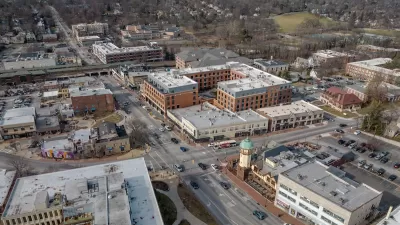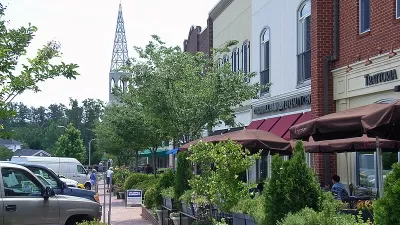"Autonomous" and "driverless" cars are surely the next frontier for automakers, as recent announcements by Audi, Toyota, and Google indicate. But are visions for the potential impact of these innovations on cities overly optimistic?
Jake Blumgart considers an article by Derek Edwards at Progressive Transit that outlines the "utopian potential" of driverless cars to transform cities. By redefining our relationship with automobiles, Edwards imagines that driverless cars could eliminate the need for owning a personal car; freeing up space dedicated to parking and eliminating the expenses of car ownership.
While Blumgart agrees that "[r]educing dependence on single-occupancy vehicles would be an unalloyed good for cities," he sees more incremental improvements in the lives of those already predisposed to suburban and urban living. "[I]t’s hard to imagine a majority of Americans willingly parting with not only control over their cars, but the actual physical ownership of the vehicle itself," he says. Rather than a wholesale revolution in our relationship to the automobile, Blumgart argues that "driverless cars could give suburbanites an easier commute, and substantially decrease the riskiness of their weekend barroom excursions, mitigating the micro-level negatives of car travel....Furthermore, it’s unlikely that an individual with a preference for urban living, and not paying for constant auto upkeep, decamping for the suburbs simply because she could take a nap on her hour-long commute to work."
"Those already predisposed to live in a central city and use car share would presumably love an enhanced on-call version of the same service," he concludes, "while those who want to live in the country will embrace safer and less arduous commutes."
FULL STORY: Whither the Driverless Car?

Planetizen Federal Action Tracker
A weekly monitor of how Trump’s orders and actions are impacting planners and planning in America.

Congressman Proposes Bill to Rename DC Metro “Trump Train”
The Make Autorail Great Again Act would withhold federal funding to the system until the Washington Metropolitan Area Transit Authority (WMATA), rebrands as the Washington Metropolitan Authority for Greater Access (WMAGA).

The Simple Legislative Tool Transforming Vacant Downtowns
In California, Michigan and Georgia, an easy win is bringing dollars — and delight — back to city centers.

The States Losing Rural Delivery Rooms at an Alarming Pace
In some states, as few as 9% of rural hospitals still deliver babies. As a result, rising pre-term births, no adequate pre-term care and "harrowing" close calls are a growing reality.

The Small South Asian Republic Going all in on EVs
Thanks to one simple policy change less than five years ago, 65% of new cars in this Himalayan country are now electric.

DC Backpedals on Bike Lane Protection, Swaps Barriers for Paint
Citing aesthetic concerns, the city is removing the concrete barriers and flexposts that once separated Arizona Avenue cyclists from motor vehicles.
Urban Design for Planners 1: Software Tools
This six-course series explores essential urban design concepts using open source software and equips planners with the tools they need to participate fully in the urban design process.
Planning for Universal Design
Learn the tools for implementing Universal Design in planning regulations.
Smith Gee Studio
City of Charlotte
City of Camden Redevelopment Agency
City of Astoria
Transportation Research & Education Center (TREC) at Portland State University
US High Speed Rail Association
City of Camden Redevelopment Agency
Municipality of Princeton (NJ)





























